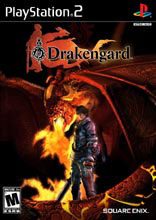|
This is a fun game that would have been ten times better if the camera did not suck so bad.
Drakengard is a cross between Dynasty Warriors (Samurai Warriors being the most recent derivative that I played) and Lair. In fact, Lair has a striking number of similarities to this game.
The mission objectives usually sound important and the voiceovers try to give you a sense of urgency. The reality, however, is that none of the enemy troops go anywhere or do anything. They occupy one area and fight you only in that local area. For instance, in one epic battle, the voiceover says to kill the commanders before they can escape. In reality, the commanders aren't trying to escape. They aren't trying to go anywhere at all. After one or two of these objectives, you catch on to this and realize how utterly useless it is for the voiceover to urge you onward.
The game features a staggering 65 weapons (I looked up a weapons guide online). The vast majority of these are worthless, so spending time leveling them up is time wasted. A few, though, are well worth it and give you a significant boost in combat.
The camera is your worst nightmare. It alone accounted for 99% of my deaths and was directly responsible for every time I threw the controller across the room. I hope the programmer responsible for that system dies a slow, painful death.
The main campaign will take about 15 hours to complete. However, if you pursue alternate endings or seek additional weapons, the game holds at least 10 more hours of new content. The way the developers make you explore the story in a non-linear fashion to discover new things and arrive at alternate endings is unique. The endings themselves are completely different from each other. In fact, the whole story has some very unexpected twists and surprises that kept me entertained and begging for more. Unfortunately, the dialog during in-game cut scenes plods along at a maddenly slow pace.
The musical score is composed of a classical selection that samples from a wide range of composers, including Mahler and Mozart. It drives you forward with relentlessly pounding repitition during combat. Throughout the story sequences it is full of odd beats and rythyms that are unsettling, much like the plot. Most of the time, music should subtly influence the emotional response of the audience. In many cases, the music here was obvious, perhaps overt in its attempts to influence me. Maybe this was intentional, maybe it's a bad thing, but it was worthy enough to gain mention here.
Though an interesting ride with basic hack-n-slash combat and a unique story-telling mechanism, I would not play Drakengard 2.
|


